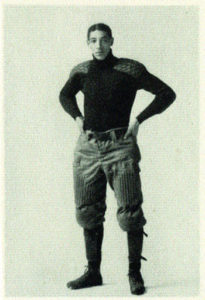
Bobby Marshall
*Bobby Marshall was born on this date in 1880. He was a Black athlete and lawyer.
From Minneapolis, Minnesota, Robert Wells Marshall's grandparents were slaves from Virginia. Richard's father met his mother, Symantha Gillespie, in Wisconsin after both families moved north. Her family (German-Jewish heritage) helped found the first AME Church in Milwaukee, and she was raised in a community where one of his best friends, Sigmund (Sig) Harris, the two went on to excel in sports at Minneapolis Central High School. The family attended St. Peter’s AME church, and after his mother died, he worked with his father as a janitor to help raise his two sisters, Sarah and Alice, and brother Lewis.
After graduating high school in 1901, he entered the University of Minnesota. Marshall was known as an “outstanding student” who studied law through the spring of 1907. He was also a fine football player who became an All-American end. His blocking gave the Gophers the tying touchdown against the University of Michigan in 1903. This game started the traditional rivalry of the Little Brown Jug between the schools. His Minnesota Gophers were the disputed champions of the West in 1904. In 1906, Marshall made headlines in the Minneapolis Tribune when he kicked the winning 48-yard field goal against the University of Chicago.
He became a Minnesota hero who fit well into the University partly because he was so fair-skinned that he was accepted in white society. Yet the Gopher football team was unique, with Marshall at the end, a Jewish quarterback (Harris), a Native American (Ed Rogers) on the line, and a generous helping of Swedes and Germans filling out their roster. In 1907, Marshall graduated from the University with a law degree. The reality was that there was no market in Minnesota for another Black lawyer, and the Black client base was small. In addition, whites preferred doing business with whites, forcing him to pursue other options to support his family. Though he opened a law office in the Metropolitan Life Building in downtown Minneapolis, sports offered him more options as an adult.
Soon afterward, he began playing segregated professional baseball part-time. In 1908, he joined the Minneapolis Keystones, where he started a friendship with one of the era's best players, Binga. In 1909, he and Binga joined the St. Paul Colored Gophers, the greatest Black baseball team in Minnesota history. Over the early years of the twentieth century, this team played against the best Black baseball teams and players in America. In 1910, Marshall and teammate Felix Wallace accepted a request from Rube Foster to join the Chicago Leland Giants. In their first Black v. White game against the Chicago Cubs, he had two errors, with no hits in a 4 to 1 loss. The season with the Giants required traveling throughout the Deep South and the Gulf of Mexico; Marshall returned to Minneapolis to play and reestablish his law practice after the season.
He joined Otto A. Pitzke and Franklin's law firm and later practiced with the offices of Nash and Armstrong. Marshall married his wife Irene in 1918, had four children, and worked as a grain inspector. From 1912 to 1930, he played, administered, or coached baseball teams (Black and white) in Minnesota; he retired in 1938. He was arguably the best athlete to come out of Minnesota but was held back from the national spotlight because of segregation. Marshall lived to see the integration of Baseball nationally and in Minnesota. The Minneapolis Millers awarded him a lifetime pass to their games, where he watched Roy Campanella, Willie Mays, Ray Dandridge, and others hone their careers.
During this time, he began to develop signs of Alzheimer’s disease; Bobby Marshall died in 1958 at the age of 72.
Swinging for the Fences, Black Baseball in Minnesota,
Ed. By Steven R. Hoffbeck
Footnotes by Kwame McDonald
Minnesota Historical Society Press
Copyright 2005